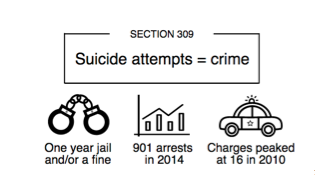-
Advocacy Theme
-
Tags
- Abortion
- Adoption
- Caregiving
- CEDAW
- Disability
- Domestic Violence
- Domestic Workers
- Harassment
- Healthcare
- Housing
- International/Regional Work
- Maintenance
- Media
- Migrant Spouses
- Migrant Workers
- Muslim Law
- National budget
- Parental Leave
- Parenthood
- Polygamy
- Population
- Race and religion
- Sexual Violence
- Sexuality Education
- Single Parents
- Social Support
- Sterilisation
- Women's Charter
World Suicide Prevention Day: AWARE calls for suicide law reform
September 8th, 2016 | News, Press Release, Suicide, Views
This post was originally published as a press release. For the full report, click here.
 In view of World Suicide Prevention Day, which falls on 10 September, AWARE has today released its report “Distress is not a crime: repeal Section 309”. The report calls for the reform of suicide laws and the improvement of support systems for those in distress – specifically, it seeks the reform and eventual repeal of Section 309 of the Penal Code, which makes attempted suicide an offence.
In view of World Suicide Prevention Day, which falls on 10 September, AWARE has today released its report “Distress is not a crime: repeal Section 309”. The report calls for the reform of suicide laws and the improvement of support systems for those in distress – specifically, it seeks the reform and eventual repeal of Section 309 of the Penal Code, which makes attempted suicide an offence.
“Suicide is a matter for social support and public health, not criminal law,” said Jolene Tan, Head of Advocacy & Research at AWARE. “Treating people as criminals worsens their distress, rather than resolving the underlying difficulties that lead to suicide attempts. The World Health Organisation (WHO) has found that suicide rates tend to decline in countries after decriminalisation.”
The report argues that even if Section 309 is not repealed, the Criminal Procedure Code should be changed so that it is no longer a seizable offence or an offence that triggers mandatory reporting, as making arrest and reporting mandatory may increase distress and deter help-seeking.
“Ideally a specialist team with psychological first aid training should be the first responders in emergency situations,” said Jolene Tan. “But if the police are involved, the process can be made less distressing by not requiring arrests.”
The report includes accounts from women that AWARE spoke to, who had negative experiences with law enforcement action related to Section 309:
- One woman, E, said that because of the threat of being charged under Section 309, she would try harder to complete any suicide attempt in the future rather than seeking help.
- A young woman, Z, who was investigated for deliberate non-suicidal self-harm, found the experience traumatising and said it led her to distrust the police.
- A third woman, B, was taken to lock-up for a suicide attempt which followed her experience of rape. She found the police officers dealing with her mocking rather than supportive.
World Suicide Prevention Day is an annual worldwide initiative by the International Association for Suicide Prevention and WHO to increase awareness of suicide as a public health issue, and of suicide prevention strategies.
“How society responds to suicide attempts is crucial – the WHO has identified prior suicide attempts as the single most important risk factor for suicide,” said Jolene Tan.
In Singapore, there was an average of about 400 suicides and 1,000 cases of attempted suicide each year between 2010-2014. While few criminal cases are filed and charged (five and one respectively in 2014), arrests are frequent – 862 in 2013 and 901 in 2014.
“The requirement to arrest creates a significant demand on police resources, which could be better used on developing psychological first aid capabilities and other priorities,” said Jolene Tan.
Dr Adrian Wang, a psychiatrist at Gleneagles Medical Centre, has said (in prior media reports) that globally, women in general have twice the attempted suicide rate as men. How society treats those who attempt suicide will therefore have a particular impact on women.
In formulating the report, AWARE consulted a range of individuals and groups. There was broad agreement among stakeholders that more can be done to ensure consistent support and sensitivity from all sectors of society toward people who attempt suicide.
AWARE’s key positions and recommendations
- Legal reform:
- Section 309 should be repealed. If it remains in the law, the Criminal Procedure Code should be amended so that it is not seizable and does not trigger mandatory reporting.
- Change the law to empower another agency (e.g. SCDF, a specialist support team) to prevent attempts, or give the police power to intervene solely for preventive purposes, without creating criminal liability (analogous to Section 7 of the Mental Health (Care and Treatment) Act, but applying beyond “mentally disordered” people).
2. Develop an institutionalised response system for suicide attempts. For instance:
- Train all police officers in psychological first aid or,
- Set up specialised unit within police force who are specially trained or,
- Partner with NGO/VWO who will provide intervention teams to accompany police when responding to suicide attempts, or
- Set up a specialist psychological support unit that may also serve as a standby in a national crisis where people may need substantial psychological support.
3. Proactively invest in promoting better support for people experiencing suicidal thoughts throughout all of society, including improving mental health support for all.
For more information about AWARE’s recommendations, please contact Ning Qian at ning@aware.org.sg.



